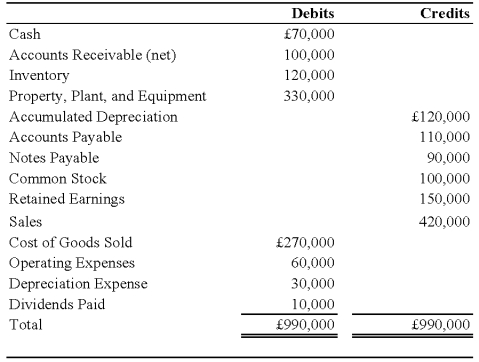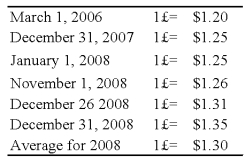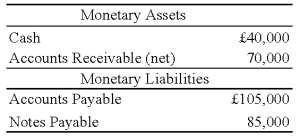On January 1,2008,Pace Company acquired all of the outstanding stock of Spin PLC,a British Company,for $350,000.Spin's net assets on the date of acquisition were 250,000 pounds (£).On January 1,2008,the book and fair values of the Spin's identifiable assets and liabilities approximated their fair values except for property,plant,and equipment and trademarks.The fair value of Spin's property,plant,and equipment exceeded its book value by $25,000.The remaining useful life of Spin's equipment at January 1,2008,was 10 years.The remainder of the differential was attributable to a trademark having an estimated useful life of 5 years.Spin's trial balance on December 31,2008,in pounds,follows:

Additional Information
1.Spin uses the FIFO method for its inventory.The beginning inventory was acquired on December 31,2007,and ending inventory was acquired on December 26,2008.Purchases of £300,000 were made evenly throughout 2008.
2.Spin acquired all of its property,plant,and equipment on March 1,2006,and uses straight-line depreciation.
3.Spin's sales were made evenly throughout 2008,and its operating expenses were incurred evenly throughout 2008.
4.The dividends were declared and paid on November 1,2008.
5.Pace's income from its own operations was $150,000 for 2008,and its total stockholders' equity on January 1,2008,was $1,000,000.Pace declared $50,000 of dividends during 2008.
6.Exchange rates were as follows:
Assume the U.S.dollar is the functional currency,not the pound.Prepare a schedule providing a proof of the remeasurement gain or loss.Assume that the British subsidiary had the following monetary assets and liabilities at January 1,2008:


Problem 74 (continued):
Definitions:
Aggregate Expenditures
The total amount of spending on goods and services in an economy at a given overall price level and in a given time period.
Spending Multiplier
the ratio of the change in total national income to the initial change in spending that brought it about, illustrating how initial spending leads to increased total spending in an economy.
Aggregate Spending
Aggregate spending is the total amount of spending in an economy, including consumption, investment, government expenditures, and net exports during a specific period.
Autonomous Saving
The portion of savings of an economy that is independent of income levels, often related to baseline savings by consumers and companies.
Q5: Based on the information given above,in the
Q10: Based on the preceding information,what is the
Q11: Based on the information given above,what amount
Q11: Based on the preceding information,what amount will
Q28: Based on the preceding information,the amount of
Q35: Based on the information given,what amount will
Q38: Based on the preceding information,the amount of
Q41: When one company purchases the debt of
Q50: Based on the information given above,what amount
Q63: Which of the following statements is (are)correct